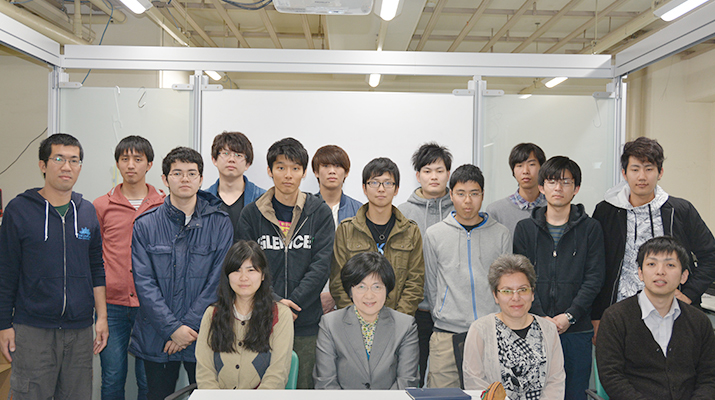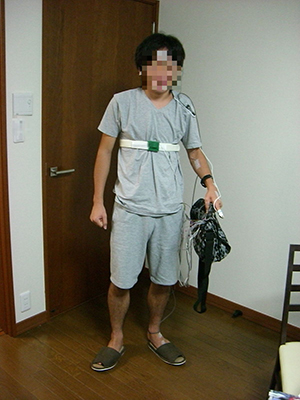
ここからコンテンツです。

Using an air conditioner in summer may affect sleep quality
The research suggests that sleep quality may be affected by subtle insensible airflow By Kazuyo Tsuzuki
Professor Kazuyo Tsuzuki, in collaboration with the National Institute of Advanced Industrial Science and Technology and Asahi Kasei Homes, conducted research on the influence of the airflow from air conditioners on sleep. Using an air conditioner helps people to sleep better on sweltering nights. However, researchers found that when airflow is directed at a human body, even at an insensible velocity, it impacts on sleep conditions causing sleeping positions and affects the depth of sleep.
A study by a joint research team including professor Kazuyo Tsuzuki of Toyohashi University of Technology, the Department of Architecture and Civil Engineering, the National Institute of Advanced Industrial Science and Technology and Asahi Kasei Homes, has revealed that airflow from an air conditioner (AC) stimulates the human body while sleeping and impacts on sleep conditions even if the mean airflow velocity is lower than an insensible level. It suggests some AC settings may have an unintentional negative impact on sleep quality despite the comfort the person feels.
Urban warming blocks the temperature from cooling at night. It causes sweltering nights which impact sleep quality. However, high-quality sleep can still be realized if the room temperature is controlled effectively with an AC. The general belief is that having the AC on all night is bad for health. Also, quite a few of us experience chills while sleeping and awakening due to cold temperatures.
Airflow velocity in the sleeping environment can be configured with the AC. However, no data on airflow velocity measurement or research on the influence of AC airflow has been available up to now.
The research team, led by professor Kazuyo Tsuzuki, had the subjects sleep in two bedrooms set to the same temperature using ACs set at different airflow velocities, then made a comparison of the depth of sleep and body temperature control using electroencephalogram (EEG) measurements as well as subjective reporting by the subjects.

We call the air velocity of 0.2m/s or lower "insensible airflow", in a sense, the person remains unaware of such a low level of airflow. In this study, a comparison was made on the influence of two types of airflow, with mean velocities of 0.14 m/s (general AC) and 0.04 m/s (customized AC), both at a room temperature of 26 °C. Subjects felt cooler with the higher airflow velocity during wakefulness and sleep. However, no significant difference was observed in the feeling of comfort, length of sleep depth, skin temperature, rectal temperature or sense of warmth or coolness in each subject before sleeping. General AC lowers airflow when the room temperature reaches the desired setting and starts increasing the flow again when the temperature is higher. The study compared the correlation between the timing of the airflow starting to blow and body movement, heart rate and waking stage in sleep depth. The results found that the subjects have significantly greater body movements, an increased heart rate and a higher frequency of waking in the room that has the AC with a mean velocity of 0.14 m/s. This suggests the general AC may have some influence on sleep, as we discovered that subjects roll over or their sleep depth changes the moment cool air blows out.
This study was conducted using healthy adult male subjects. It implies that the cold airflow may have a greater impact on the overall sleep of female and elderly subjects with lower physical strength or a greater sensitivity to cold. The result of this study is expected to be a useful clue as to how to configure the airflow velocity of an AC to create a comfortable sleeping environment.
This research is the result of the study conducted by Professor Kazuyo Tsuzuki at the National Institute of Advanced Industrial Science and Technology. The research results were reported online in the Energy and Buildings journal on December 23, 2016.
This research was conducted with the Grants-in-Aid for Scientific Research #21300271 and #25282016 by Ministry of Education, Culture, Sports, Science and Technology and Japan Society for the Promotion of Science.
Reference
Morito, N., Tsuzuki, K., Mori, I., and Nishimiya, H. (2017). Effects of two kinds of air conditioner airflow on human sleep and thermoregulation. Energy and Buildings, 138,490-498.
http://dx.doi.org/10.1016/j.enbuild.2016.12.066
夏のエアコン、快適と感じていても睡眠の質が悪化している?
人が感じない程度の速さの風であったとしても、睡眠は影響を受けている可能性を示唆都築和代教授は、産業技術総合研究所、旭化成ホームズと共同で、エアコン冷房の気流が睡眠に与える影響について調べました。熱帯夜であってもエアコンを使って部屋の温度を快適にコントロールすることにより、よく眠ることができます。しかし、感じるか感じない程度の風速であっても、エアコンの風が寝ている人にあたると、体を動かしたり、睡眠深度が変わったりするなどの影響を受けることを明らかにしました。
豊橋技術科学大学建築・都市システム学系の都築和代教授と産業技術総合研究所、旭化成ホームズの共同研究チームは、エアコンの平均風速が不感気流以下であっても、寝ている時には身体への刺激となり、睡眠が影響を受けることを明らかにしました。これは、エアコンの設定によっては、人が快適だと感じていても、気づかないうちに睡眠の質を悪くしてしまっている可能性もあることを示唆するものです。
都市の温暖化は夜間の気温低下を妨害します。その結果、熱帯夜で睡眠の質が悪化することが多くなります。しかし、エアコンによって部屋の温度がうまく調節されれば、質の良い睡眠がとれます。とはいえ、一晩中エアコンを使うと体に悪いという風聞があり、また、寝冷えをしたり、寒さで途中に目が覚めたりした経験がある人は少なくありません。
就寝環境のエアコンの設定において、風の強弱を設定することはあるものの、実際の風速を測定したデータは提示されておらず、エアコンからの気流の影響について検討された研究はこれまでありませんでした。
都築和代教授らの研究チームは、風速が異なるエアコンを用いて、同じ温度に設定した2つの寝室で睡眠をとった時の、脳波計測による睡眠深度や体温調節、主観申告に及ぼす影響を比較しました。
0.2m/s以下の速さの気流は、人が感じない気流という意味で不感気流と呼ばれます。本研究では、26℃の室温で、平均風速が0.14m/s(一般的なエアコン)と0.04m/s(特別仕様のエアコン)の2種類の気流の影響を比較しました。その結果、被験者は起床時や寝ている時には、気流が速い方を涼しく感じていましたが、一晩を通しての快適感、各睡眠深度の長さ、皮膚温や直腸温、寝る前の温冷感には有意な違いが認められませんでした。一般的なエアコンは、室温が設定温度になると気流が弱まり、室温が上がると再び気流が吹き出します。そのため、気流の吹き出すタイミングと体の動き、心拍数、睡眠深度の中での覚醒段階との関係について比較したところ、平均風速0.14m/sのエアコンの方が、体動、心拍数の上昇、覚醒の頻度が有意に多くなりました。つまり、一般的なエアコンでは、冷風が吹き出す瞬間に、寝返りを打ったり睡眠深度が変わったりすることが判明し、睡眠に何らかの影響与えている可能性があることが示唆されました。
この研究は健康な青年男性を被験者として実施しました。体力が劣っていたり、寒さに敏感な女性や高齢者であれば、睡眠全体により大きな影響を与えた可能性が推察されます。また、本研究の成果は、快適な睡眠環境を作り出すためのエアコンの風速設定について、有用な手がかりになることが期待されます。
本研究は、都築和代教授が産業技術総合研究所において実施した研究成果です。 また、本研究の成果は2016年12月23日Energy and Building誌にオンライン版で掲載されました。
本研究は、文部科学省・日本学術振興会科学研究費#21300271、#25282016、の補助を受けて遂行されました。
Researcher Profile

| Name | Kazuyo Tsuzuki |
|---|---|
| Affiliation | Department of Architecture and Civil Engineering |
| Title | Professor |
| Fields of Research | Building environmental engineering / Environmental ergonomics |
ここでコンテンツ終わりです。
